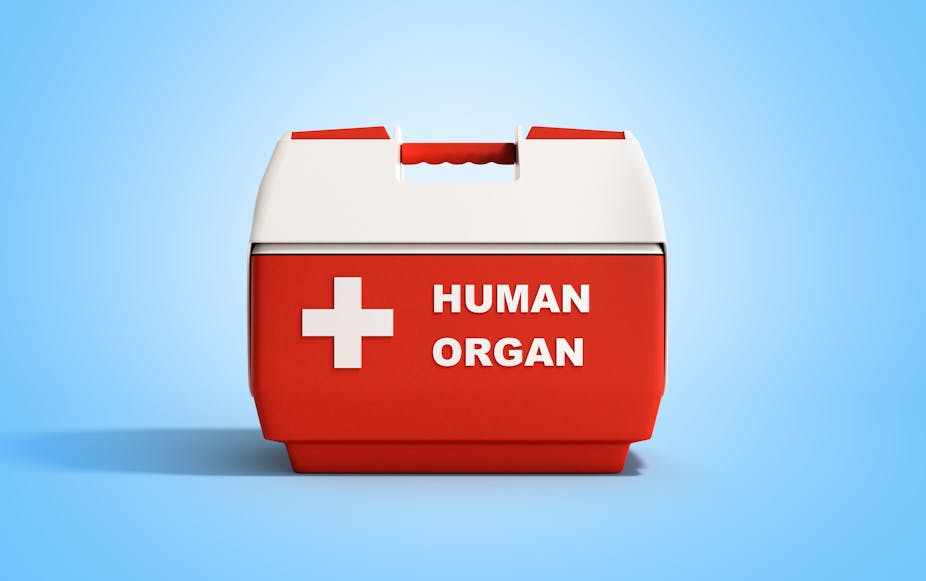Around one in six people awaiting an organ transplant in the UK will die or become ineligible due to deteriorating health before an organ is available. Many blame this situation on England’s current “opt-in” donor scheme – if you want to donate your organs after you die, you have to give express permission.
But that is about to change. From April 2020, everyone resident in England over the age of 18 will be deemed, in law, to have consented to the donation of their organs after death. If they don’t want to be a donor, people will have to “opt-out”.
This idea of “deemed consent” – assuming consent in the absence of a recorded refusal – will form the basis for the NHS having the power to remove and use organs. But it remains understandably controversial. Much of this debate could be avoided if we stopped talking about consent and started talking about altruism.
Read more: Organ donation campaigns could be more effective if they focused on feelings rather than facts
Presuming consent is flawed
In law, consent is the main justification for interfering with a person’s body. It is about as close as the law comes to recognising that we can control what happens to our bodies without recognising the body as some form of property. Giving or withholding our consent is a way of controlling what happens to our bodies – in life and after death. But consent captures something much bigger than just “control”. Consent is one way of expressing our personal autonomy.
Autonomy can mean self-governance or self-determination – choosing the way that we want to live our lives and making decisions which reflect those choices. We can exercise our autonomy in all kinds of daily decisions – in the clothes we wear, the foods we eat, the political parties we vote for, and the intimate relationships we form.
Often, we would like to think that we make these choices because they reflect our own beliefs, opinions and values. Sometimes, our beliefs clearly motivate our actions and choices. I might choose to limit my sugar consumption because I believe that this will keep my body healthy. Or because it shows that I have some degree of self-restraint, which might be an important value for my own sense of self. In this simple example, we can see that autonomy represents a clear line flowing from my beliefs and values to my actions.

But it’s not always so easy to identify our beliefs and values. It’s quite normal for these to change – perhaps over the course of a few years, but maybe day to day. Some of our core preferences may remain clear and stable, unwavering in the face of challenging information or arguments. Intuitive convictions about the morality of, say, the death penalty, may prove to be unshakeable.
Others will vary depending on our moods, on the opinions of people around us, or following new experiences. We’re more likely to reflect on our attitudes towards controversial types of medical treatments, such as care at the end of life or abortion, in light of personal experience.
Some of our attitudes and beliefs may even be quite uncomfortable for us to hold. We may be ashamed about our desires and the choices we make in response to them. Sometimes we may not even fully understand why we do, or think, certain things – our beliefs can be incredibly contradictory and complex.
Consent – at least in the eyes of the law – appears to be about making simple decisions that are informed by our beliefs, which we can fully understand and identify with. But the reality is that our decision-making process, our identities and sense of selves are far more complicated than that.
For a kinder society
Controlling our bodies, and stopping others from interfering with them, is central to our autonomy. Our bodies are perhaps the most intimate part of our selves. Granting another person access to our bodies – even taking parts away from that body – has the potential to bring about the most serious conflicts in our beliefs and values.
If we may struggle to understand our own “autonomy”, and what it means to make autonomous decisions, then it seems to be an impossible task to presume to know what others believe and to decide with certainty how they would like their bodies to be dealt with.
Rather than speculating about how people may feel about donation, we should be more open about the aspirations of the organ donation project – to foster a society where people want to donate because this could help others to continue living their lives.

This nudge towards altruism is already implicit in the law. Even the new legislation’s name – Max and Keira’s Law – evokes the story of a nine-year old girl whose tragic death allowed 11-year old Max a life-saving heart transplant. Emotive stories of good deeds might shift attitudes in the short term, but a more systemic, deeply engrained approach towards altruism is needed to secure a lasting shift.
For many, the decision to donate is already motivated by altruism – the desire to help others without reward. The law reflects this – it’s a criminal offence to offer or receive a reward for an organ donation. If the law can be so blatant in its presumption of altruism here, why not be as explicit in the legal basis of donation? Instead of trying to presume consent, why not presume that altruism is a shared social value worth protecting and promoting?

